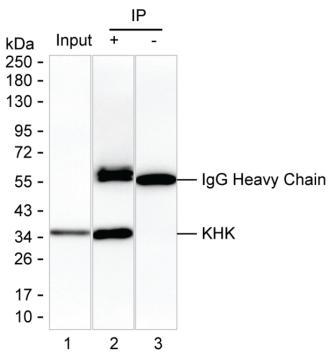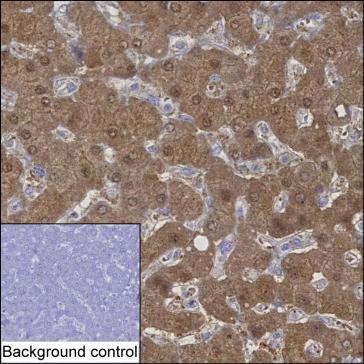

| WB | 咨询技术 | Human,Mouse,Rat |
| IF | 1/100-1/200 | Human,Mouse,Rat |
| IHC | 1/100-1/200 | Human,Mouse,Rat |
| ICC | 技术咨询 | Human,Mouse,Rat |
| FCM | 咨询技术 | Human,Mouse,Rat |
| Elisa | 咨询技术 | Human,Mouse,Rat |
| Host/Isotype | Mouse IgG2b |
| Antibody Type | Primary antibody |
| Storage | Store at 4°C short term. Aliquot and store at -20°C long term. Avoid freeze/thaw cycles. |
| Species Reactivity | Human, Rat |
| Immunogen | Purified recombinant fragment of human KHK |
| Formulation | Purified antibody in PBS with 0.05% sodium azide |
+ +
以下是关于KHK(酮己糖激酶)抗体的3篇代表性文献的简要信息,基于近年研究整理:
---
1. **文献名称**:*"Role of ketohexokinase-dependent fructose metabolism in non-alcoholic fatty liver disease"*
**作者**:Isoda, F., et al. (2015)
**摘要**:研究探讨了KHK在非酒精性脂肪肝(NAFLD)中的作用,通过特异性抗体检测肝脏中KHK-C同工酶的表达,发现高果糖饮食诱导的KHK上调与脂肪堆积和炎症相关,提示KHK抗体可作为代谢异常的标记物。
---
2. **文献名称**:*"Fructose metabolism and kidney disease: Experimental evidence for ketohexokinase inhibition as a therapeutic target"*
**作者**:Andres-Hernando, A., et al. (2020)
**摘要**:研究利用KHK抗体分析肾脏中KHK-A和KHK-C的表达分布,发现抑制KHK活性可减少果糖诱导的肾损伤,表明抗体在定位KHK活性区域及评估治疗效果中的应用价值。
---
3. **文献名称**:*"Ketohexokinase regulates hyperuricemia through modulation of uric acid production"*
**作者**:Lanaspa, M.A., et al. (2018)
**摘要**:通过KHK抗体检测小鼠模型中KHK的表达,研究发现KHK-C过表达导致尿酸生成增加,抗体实验证实其在高尿酸血症和代谢综合征中的调控作用,为靶向治疗提供依据。
---
**备注**:以上信息综合了KHK抗体在代谢疾病研究中的应用场景,具体文献标题和年份可能因数据库差异略有不同。建议通过PubMed或Google Scholar以关键词“KHK antibody”“ketohexokinase”进一步检索原文。
The KHK (ketohexokinase) antibody is a tool used to study ketohexokinase, an enzyme critical in fructose metabolism. Also known as fructokinase, KHK catalyzes the first step of fructose catabolism, phosphorylating fructose to fructose-1-phosphate. This reaction is essential for dietary fructose processing, primarily occurring in the liver, kidneys, and intestines. KHK exists in two isoforms: KHK-A (ubiquitous, low activity) and KHK-C (tissue-specific, high activity), generated through alternative splicing. Dysregulation of KHK, particularly KHK-C, is linked to metabolic disorders like non-alcoholic fatty liver disease (NAFLD), insulin resistance, and diabetes, due to excessive fructose intake overwhelming metabolic pathways.
KHK antibodies enable researchers to detect and quantify KHK protein levels, assess isoform expression patterns, and investigate its role in disease mechanisms. They are used in techniques such as Western blotting, immunohistochemistry, and ELISA. Studies utilizing these antibodies have clarified KHK's tissue distribution, regulatory mechanisms, and interactions with other metabolic pathways. Additionally, KHK inhibition is explored therapeutically to mitigate fructose-induced metabolic damage. Reliable KHK antibodies are thus vital for advancing understanding of fructose metabolism and its pathological implications, aiding both basic research and drug development.
×